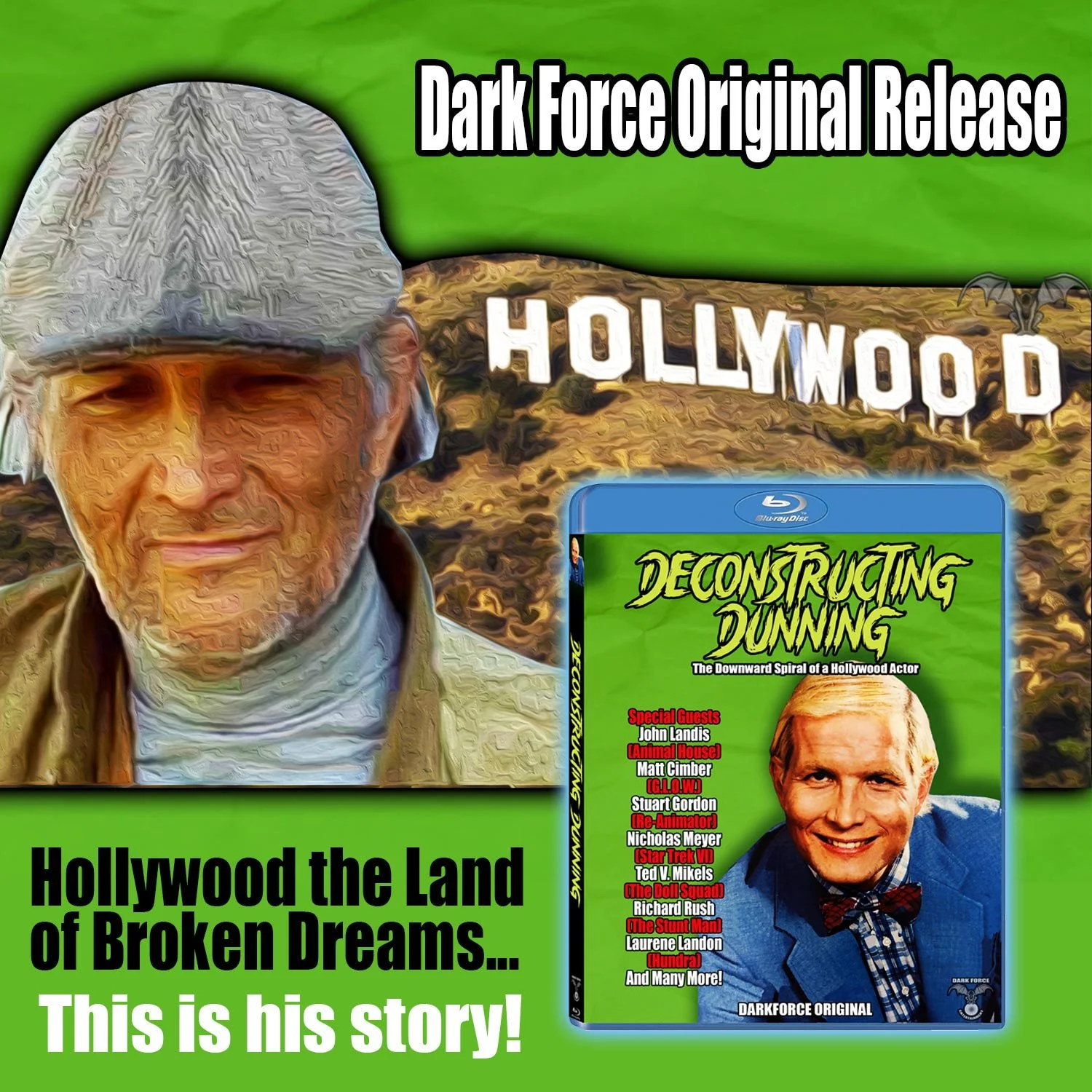The Depressing 2016 Documentary Deconstructing Dunning Is a Tragicomic but Mostly Just Sad Look at a Kooky Hollywood Character
Welcome, friends, to the latest entry in Control Nathan Rabin 4.0. It’s the career and site-sustaining column that gives YOU, the kindly, Christ-like, unbelievably sexy Nathan Rabin’s Happy Place patron, an opportunity to choose a movie that I must watch, and then write about, in exchange for a one-time, one hundred dollar pledge to the site’s Patreon account. The price goes down to seventy-five dollars for all subsequent choices
The IMDB summary for the 2016 documentary Deconstructing Dunning posits the film as the “story of a smelly, unstable, homeless liar who struggles with reality in order to live out his dream of being an Actor.”
That might seem unspeakably cruel because it is ragingly insensitive, but its depiction of its subject could, astonishingly, be even harsher.
Whoever wrote that Douglas Dunning was smelly, unstable, homeless, and a liar who struggles with reality could have also mentioned that he has such deplorable dental hygiene that a dentist describes him as having worse teeth than someone who won a reality show for having the worst teeth in America.
They could have pointed out that women find Dunning repulsive, that he’s unemployable and prone to racist outbursts.
I love writing about crazed narcissists who have no idea that a massive gulf exists between how they see themselves and how the world sees them.
Douglas Dunning, the subject of Deconstructing Dunning, embodies this curious breed. An interview subject compares him to Tommy Wiseau, another quintessential Hollywood character whose history is a tantalizing mystery.
The key difference is that Wiseau inexplicably had a furtive fortune that empowered him to spend millions of dollars making a movie that looks like it cost thousands, while the smelly and homeless Dunning has nothing but delusions about himself and his place in the world.
Dunning is best known for playing Sir Miles Headlock, a riff on Max Headroom, on twenty-six episodes of the cult 1980s wrestling show G.L.O.W. His resume is otherwise littered with roles as extras in schlock with titles like Cannibal Hookers, Hell Comes to Frogtown, Fertilizing the Blaspheming Bombshell, and Creeporia.
The magic of Hollywood is that you can cast off your dreary true self and become whoever you want to be. Dunning decided to be an English raconteur and close friend and protege of Christopher Lee, with a never-ending array of juicy anecdotes that sound fake because they are.
The only role Dunning plays authoritatively is Douglas Dunning, ACTOR. Even then, it’s apparent to anyone who spends any time with the ham actor that he isn’t anything he pretends to be, beginning with a robust British accent that is his trademark but also very obviously fake.
Dunning is unstable and struggles with reality because he is mentally ill. The uniquely mean-spirited film is less interested in deconstructing its subject than in enjoying bad-taste laughs at his expense, but the comedy is too dark to be funny.
The failed actor and equally unsuccessful human being is not mentally ill in a harmless way. He’s the kind of outsized oddball that people tell stories about/file restraining orders against.
During a recreation of Dunning’s wildly fictionalized account of his time in prison, the actor gingerly offers multiple racial slurs for African Americans and Hispanics.
When the director tries to convince him that using that kind of language will render him unsympathetic, he defends his unfortunate word choice as realism, but this is a rare instance of the filmmaker actively trying to make Dunning more likable, or at least less loathsome.
Late in the film, a struggling actress takes pity on Dunning and invites him to move in with her. Within the context of the documentary, this is an act of Christ-like selflessness and generosity toward someone who does not deserve it. Dunning is less the hero of Deconstructing Dunning, or even the anti-hero, than its villain.
Director Tracy Tuffs tries to delicately explain to the good Samaritan that Dunning is not like other people and that volunteering to live with him might be the worst idea in the history of the universe.
Tuffs explains that Dunning isn’t just an actor who is down on his luck and could use a helping hand. He is, instead, a shambling mess of a human being who will make her miserable if she has the terrible judgment to go through with her plan.
The filmmaker’s need to protect the woman from making a terrible mistake with potentially huge ramifications overrides any positive feelings he may have toward Dunning.
When Tuffs tells the woman that Dunning lives in shit, he does not appear to be speaking figuratively. In an unsurprising development, the eccentric older actor quickly exhausts the patience of the poor woman, leading to her request for him to leave.
The implication is that Dunning is beyond help and beyond redemption. The woman makes the mistake of lending her temporary roommate money that he cannot and will never repay because he is unemployable.
There are, at the moment at least, government programs to help the mentally ill that Dunning is presumably eligible for, but he seemingly does not want help; he wants fame.
When Tuffs finally gets Dunning to reveal his non-British origins, it feels anti-climactic, like discovering that Superman is actually from New Jersey rather than Krypton.
Whether it’s establishing that the Pigpen-like Dunning’s body odor is so overpowering that he can be smelled from space or documenting a weekend at a pop culture convention where he sells exactly three autographs, Deconstruction Dunning takes unseemly glee in its subject’s suffering.
I found myself feeling sorry for Dunning. As someone whose career and life have been negatively affected by mental illness and an inability to understand a world that feels both incomprehensible and unfathomably cruel, I identified with Dunning more than is probably healthy.
It’s hard to wake up every morning and muster up the energy and enthusiasm to keep going when everything feels hopeless and impossible, even if someone isn’t making a film about how you smell bad, are homeless, and lie as reflexively as other people breathe.
Deconstructing Dunning is equal parts engaging and dispiriting. It's a depressing portrait of a man with a sad life, a heartbreaking past, and a bleak future.
The mean-spirited portrait of a colorful figure, eccentric even by Hollywood standards, captures everything that makes Dunning a kooky show-business character but fails to capture the towering thespian’s tragicomic humanity.
You can pre-order The Fractured Mirror here: https://the-fractured-mirror.backerkit.com/hosted_preorders
Nathan needed expensive, life-saving dental implants, and his dental plan didn’t cover them, so he started a GoFundMe at https://www.gofundme.com/f/support-nathans-journey-to-dental-implants. Give if you can!
Did you enjoy this article? Then consider becoming a patron here.








